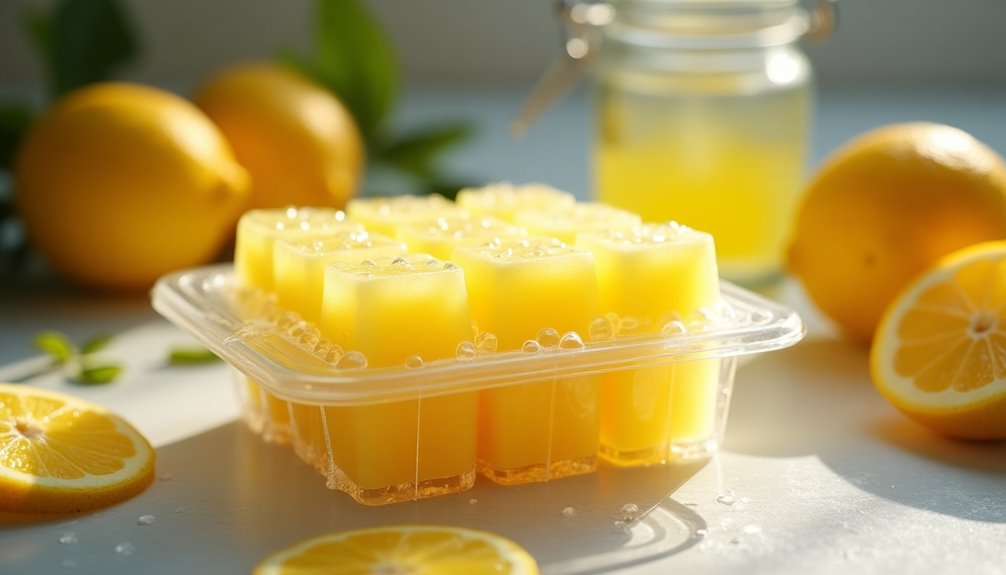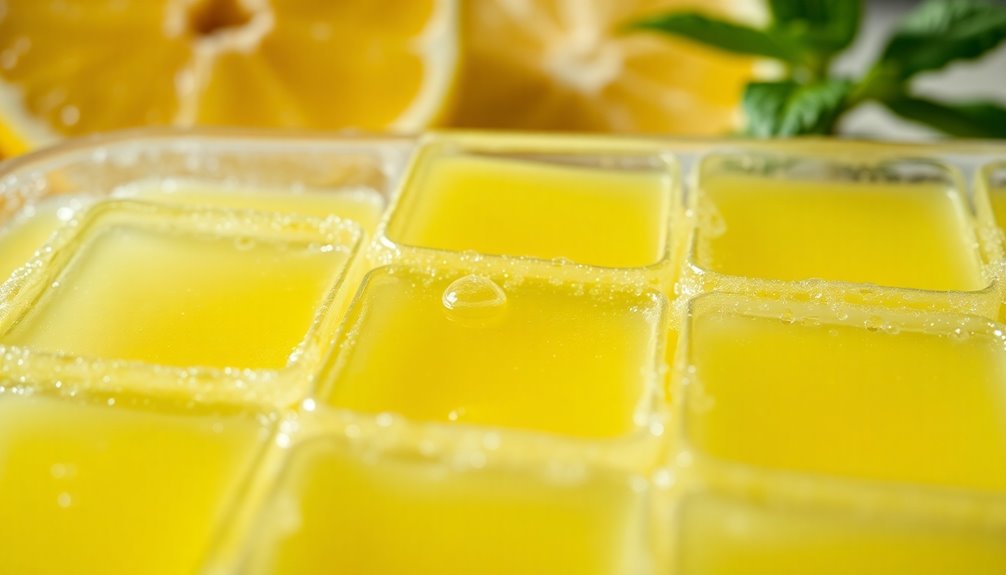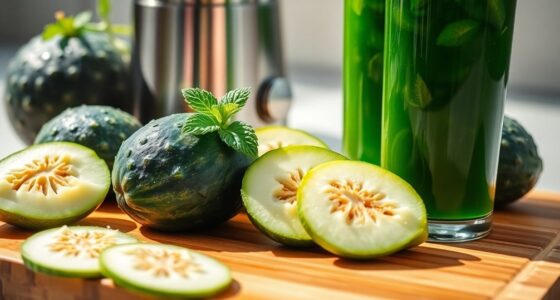You can freeze freshly squeezed lemon juice for up to three months without losing much flavor or quality. If you want to keep it optimal, aim to use it within 6-8 months. Just make sure to store it in airtight containers or ice cube trays to prevent freezer burn. Plus, labeling your containers helps you track how long it's been in the freezer. Stick around to find out more about storing and thawing your lemon juice properly!
Key Takeaways
- Freshly squeezed lemon juice can be frozen for up to three months without significant loss of flavor or quality.
- Optimal freshness is recommended within 6-8 months, though quality may decline after that.
- Use airtight containers or ice cube trays to prevent freezer burn and maintain quality.
- Label containers with the freezing date to track duration and avoid waste.
- Thawed lemon juice can be refrozen, but avoid multiple freeze-thaw cycles for best taste.

Have you ever wondered how long you can freeze lemon juice without losing its fresh flavor? You're not alone in this curiosity. Fresh lemon juice is a versatile ingredient, perfect for everything from salad dressings to cocktails, and knowing how to preserve its vibrant taste can be a game changer.
When you freeze lemon juice, you can extend its shelf life significantly, but there are some essential tips to keep in mind to ensure you maintain its quality. To start, freshly squeezed lemon juice can typically be frozen for up to three months without any significant loss of flavor or quality. This is great news if you've got a surplus of lemons or just want to have some handy for later use.
When you decide to freeze lemon juice, it's crucial to use airtight containers or ice cube trays for storage. Airtight containers help prevent freezer burn, while ice cube trays are fantastic for easy portioning. You can freeze lemon juice in individual cubes, making it easy to grab just the right amount for your recipes.
Before you pop those containers or trays into the freezer, make sure to label them with the date. This simple step ensures you keep track of the freezing duration and helps you use the juice within the recommended time frame. It's easy to forget when you stored something, especially in a busy kitchen, so being organized will save you from possible waste.
Once your lemon juice is frozen, it can be thawed when you need it. Keep in mind that thawed lemon juice can be refrozen if necessary, but it's best to avoid multiple freeze-thaw cycles. Each cycle can diminish the quality of the juice, so try to plan ahead and only thaw what you'll use.
For optimal freshness, it's recommended to use those frozen lemon juice cubes within 6-8 months. While they may still be safe to consume beyond that timeframe if stored properly, the flavor and quality might start to decline.
When you're ready to use your thawed lemon juice, simply take out the amount you need, and let it warm up to room temperature. You can easily add it to your favorite recipes, enjoying that bright citrus flavor.
Remember that the key to success lies in proper storage techniques, so always use airtight containers or freezer bags, and don't forget to label them.
Frequently Asked Questions
Does Lemon Juice Go Bad if Frozen?
Yes, lemon juice can go bad even if it's frozen.
While freezing helps preserve its quality, you might notice changes in flavor or smell after a few months.
If you see any off-smells or color changes, it's best to discard it.
Proper packaging in airtight containers can extend its freshness, but remember that even frozen lemon juice isn't immune to spoilage if stored too long.
Always check before using!
What Is the Best Way to Freeze Fresh Lemon Juice?
If you want to freeze fresh lemon juice, start by pouring the juice into ice cube trays.
Each cube usually holds about 2 tablespoons, making it easy to use later.
Once they're frozen, transfer the cubes to a freezer-safe bag, removing any excess air to avoid freezer burn.
Don't forget to label the bag with the date!
This way, you'll always know when you need to use those zesty ice cubes.
Does Freezing Lemon Juice Destroy Vitamin C?
Freezing lemon juice doesn't destroy vitamin C significantly.
In fact, you'll find that most of its vitamin C content remains stable for several months in the freezer.
While there might be a slight decrease over time, it's minimal if you store it properly in airtight containers.
To keep as much vitamin C as possible, freeze your lemon juice right after squeezing, limiting its exposure to air and light.
How to Preserve Fresh Lemon Juice for a Long Time?
To preserve fresh lemon juice for a long time, you can freeze it.
Start by squeezing the lemons and pouring the juice into ice cube trays, filling each cube to about 2 tablespoons.
Once frozen, transfer the cubes to airtight containers or ziplock bags, labeling them with the date.
This method keeps the flavor intact and makes it easy to use whenever you need some fresh lemon juice in your recipes!
Conclusion
Freezing lemon juice is a great way to capture its vibrant, zesty essence for future use. Picture a sparkling ice cube tray filled with bright yellow juice, ready to brighten up your dishes or drinks long after the harvest. You can safely freeze it for about three to six months, preserving that refreshing tang. So go ahead, freeze some lemon juice, and let the sunshine of summer linger in your kitchen, even in the coldest months.
Cindy thoroughly researches juicing trends, techniques, and recipes to provide readers with practical advice and inspiration. Her writing style is accessible, engaging, and designed to make complex concepts easy to understand. Cindy’s dedication to promoting the advantages of juicing shines through her work, empowering readers to make positive changes in their lives through the simple act of juicing.











